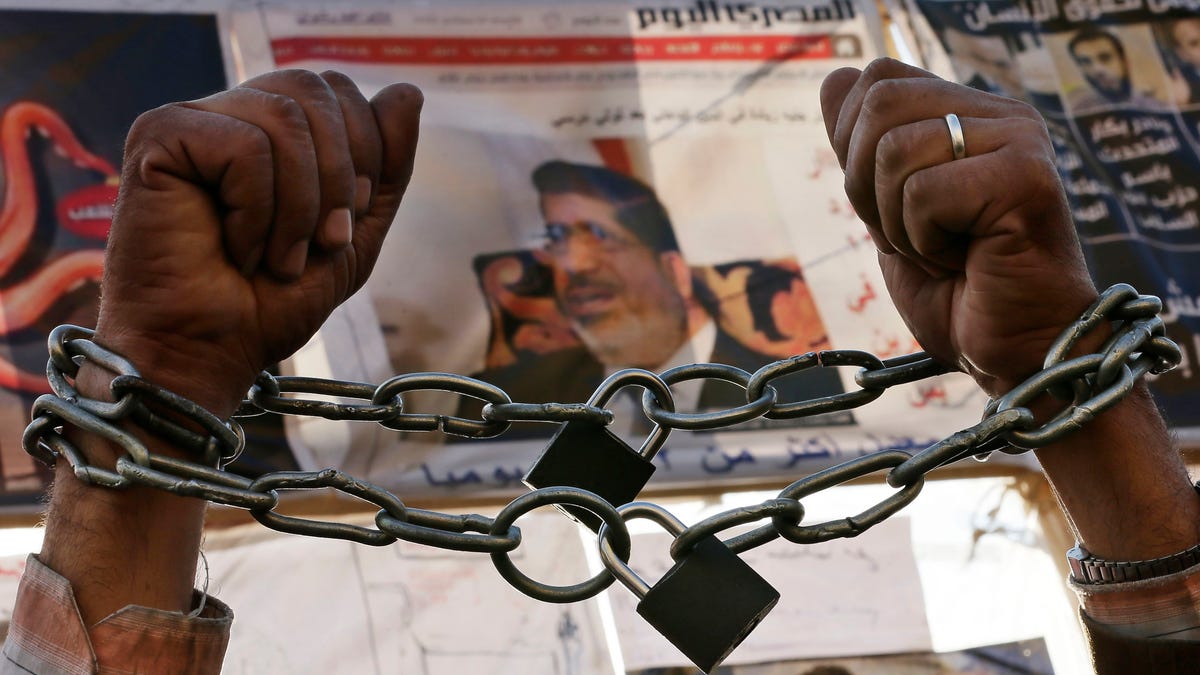
Dec. 17, 2012: A protester chains his hands during a protest in Tahrir Square in Cairo, Egypt, Monday, Dec. 17, 2012. (AP)
CAIRO – Egypt's opposition alliance is gearing up for mass rallies across the country on Tuesday to protest a highly contentious Islamist-backed draft constitution and to denounce violations that they claim were rife during a first round of voting on it.
Since the country's current political crisis erupted more than three weeks ago, the opposition has kept the pressure on the government of President Mohammed Morsi with mass marches that at times have seen turnouts of hundreds of thousands. The Islamists have organized rival rallies.
Tuesday's planned protests in front of the presidential palace and in Cairo's Tahrir Square as well as other city centers around the country are the first major push by the opposition since Saturday's round of the referendum on the constitution, in which preliminary results showed that 56 percent of voters had cast "yes" ballots. The next round of voting is schedule for Saturday, Dec. 22.
Islamists have suggested that passage of the constitution will give them a mandate, but the opposition says the process has been rushed, turnout has been low, and irregularities in the voting has been rife. They say that the constitution requires more than a simple majority, and many have called for the referendum voting to be re-held. The Brotherhood says the country's Elections Committee can adjudicate any complaints.
The protests also follow closely on new salvos in the conflict between Morsi and the judiciary: one top group of courts announced its boycott of the second round of referendum voting, while the embattled Morsi-appointed Prosecutor General Talaat Abdullah submitted his resignation.
Abdullah had come under fire from fellow prosecutors who accused him of pressuring a judge not to release some 130 anti-Morsi protesters from detention.
The vote on Egypt's post-revolution constitution comes against a backdrop of deep polarization that split the country's political forces into two camps: one led by Islamists including Morsi's Muslim Brotherhood group and ultraconservative Salafis, and the second led by the National Salvation Front, an alliance of liberal and left-leaning political parties and youth groups backed by Christians and many Muslims who are skeptical of the Brotherhood.
For many, a decree by Morsi on Nov. 22 brought the simmering conflict between Egypt's newly empowered Islamists and political opposition and judiciary, to the open. The "constitutional declaration" gave Morsi's decisions immunity from judicial oversight and protected the Islamist-dominated Constituent Assembly, whose predecessor had been dissolved by court order.
Morsi subsequently rescinded the decree but the protests set the scene for a new round of confrontation over the constitution. The drafting panel passed the draft in a marathon session on Dec. 1.
Liberal members, Christians' representatives and others long criticized the Islamist domination of the process, particularly the insertion of clauses that they say pave the way to a religious state and threaten civil liberties. They say the breakneck pace of its drafting and passage will only polarize the country further.
The Brotherhood deny this, arguing that the passage of the constitution will be a much-needed boost for political stability.
Preliminary results show that the "yes" vote carried the first round by a margin of 56 percent. Rights groups and opposition say they filed complaints of violations marring the vote, including judges who they intentionally stalled the vote in constituencies anticipated to oppose it. They also say judges, whose supervision is required by law in Egyptian elections, were replaced by court employees in some districts to replace judges who boycotted the vote.
But one prominent judicial body that did involve itself in the first round of voting, the State Council, says that it will boycott the second round in protest at the alleged irregularities. The Council provided 1,500 of the 7,000 judges involved in the first round.
Many top Brotherhood officials have consistently characterized their critics as holdovers from the era of deposed president Hosni Mubarak. Most top judges are Mubarak-era appointees but the National Salvation Front is largely made of the Mubarak-era opposition, and Morsi's critics also include some Islamists.
On Monday, Egypt's Supreme Constitutional Court -- the country's most prestigious tribunal that is at the center of the Brotherhood's conflict with the judiciary -- denounced a statement by a Morsi aide in which it discussed the court under a "campaign" by "anti-revolutionary forces" to "overturn the gains of the revolution" against Mubarak.
Court spokesman Maher Sami accused Essam el-Haddad's of "tarnishing" the court's image and criticized him for writing the memo in English.
"The Supreme Constitutional Court is asking why the president's aide chose to address the foreign media," he said. He added el-Haddad aimed at "toppling down the court's reputation internationally" and that the "crime of spreading false and instigating news that is punishable by law."
